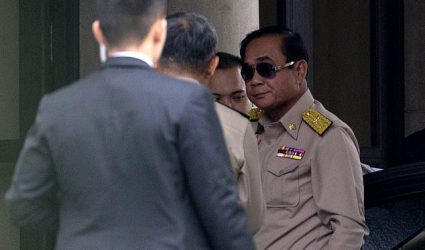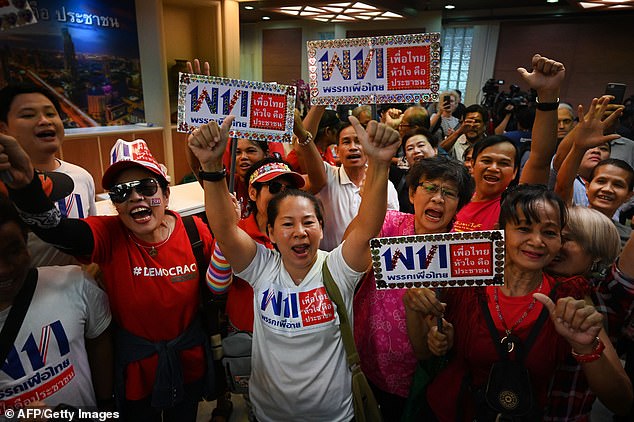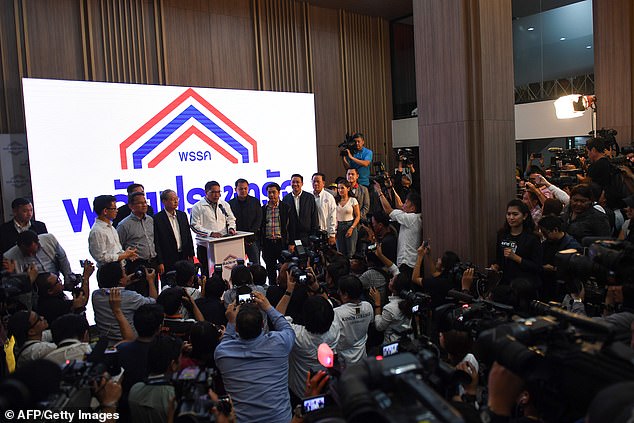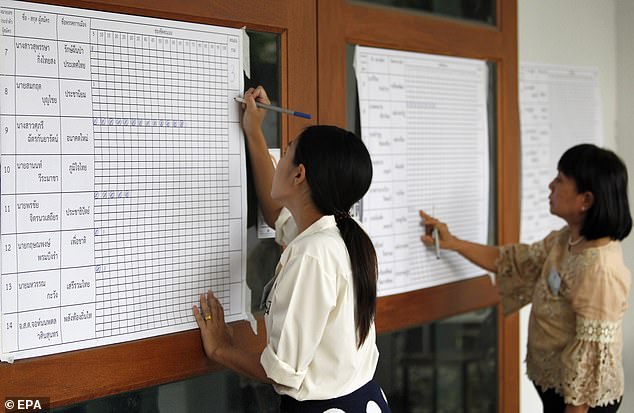Thailand election chaos as military-backed party and opposition movement BOTH claim victory, amid claims the results ‘don’t add up’

Junta leader could stay in power after Thailand’s first election since a 2014 coup. Military-backed party appeared to have most votes but opposition most seats. The country is likely to face several weeks of bargaining among political parties.
(Daily Mail) – Thailand’s political future has been thrown into chaos as both major parties claimed victory in the country’s first election since a 2014 coup.
Military-backed party Palang Pracharat appeared to have the most votes in preliminary results, meaning junta leader Prayuth Chan-ocha could stay in power.
But the results were met with immediate scepticism as another party leader said: ‘The numbers don’t add up’.
Main opposition party Pheu Thai, the former governing party ousted by the coup, appeared on course to win the most seats.

Both sides said they will form a government but results for the 500-member parliament are not yet complete and a new PM will need support from the junta-appointed Senate to win power.
There are 150 seats still to announce and officials have said the final, certified results may not come in until May.
One party said it was mulling a legal challenge after early figures suggested junta leader and current prime minister Prayuth Chan-ocha could hold on to in power.
With 93 per cent of votes counted late on Sunday, the Palang Pracharat party was first with nearly 7.6million votes, according to the Election Commission.
Pheu Thai, the former governing party which is allied to exiled Thai leader Thaksin Shinawatra, was next with 7.1million votes.

The strong showing by the pro-junta Palang Pracharat stunned voters who had hoped the poll would loosen the grip that traditional elites and the military hold on power.
Uttama Savanayana, the head of the Palang Pracharat party , said it would contact like-minded parties to form a new administration.
Many took to social media to voice their suspicions about the results of an election that critics had said was systematically skewed in favour of the military from the outset.
Thai-language hashtags that translated as ‘Election Commission screw-up’ and ‘cheating the election’ were trending at numbers one and three on Twitter in Thailand.
Many tweets referred to inconsistencies between the numbers for voter turnout and ballots cast in some parliamentary constituencies.

‘There are irregularities in this election that we’re not comfortable with. These affect the nation’s credibility and people’s trust,’ said Sudarat Keyuraphan, candidate for prime minister of the Pheu Thai party.
‘We’ve voiced our concerns before for vote-buying, abuse of power, and cheating. All three have manifested. We will fight back through legal means,’ she said.
She said her party, which is linked to the military’s nemesis, former leader Thaksin Shinawatra, would join forces with other anti-junta parties to form a government.
Pheu Thai’s performance will be seen as falling short of expectations given that Thaksin-allied parties have won every election since 2001.
The overall winner of Sunday’s election may not emerge for weeks because the Election Commission has said it will announce the official results of the final 150 seats in the 500-seat parliament on May 9.
Future Forward, a new party that appears to have made a spectacular election debut thanks to its appeal to young voters, also questioned the poll numbers.
‘There are obviously some irregularities with the numbers because they don’t add up. This is making people sceptical of the election results,’ said party spokeswoman Pannika Wanich.
‘The Election Commission should address this issue because if the people feel they cannot trust the results, there will be more problems to come,’ she said.
The country is likely to face several weeks of bargaining among political parties before a potentially unstable coalition government is formed in May or June.
Thais voted for a 500-member parliament, which along with a 250-member junta-appointed Senate will decide the next prime minister.
A new party, Future Forward, which was anti-junta and popular with young voters, scooped up 5.2million votes.
But voters deserted the Democrat Party, the country’s oldest political party, in its Bangkok and southern strongholds.
Its leader, former Prime Minister Abhisit Vejjajiva, resigned. Another party, Phumjai Thai, which experts say could support the junta, picked up 3.2 million votes.
‘It looks unlikely that a sizeable enough anti-junta majority will form in the House to put pressure on the military to back away,’ said Peter Mumford, an analyst at Eurasia Group, which advises international companies on political risks.
That combined with the role of junta-appointed senators in helping to pick the next prime minister means Prayuth ‘remains in pole position for now,’ he said in a post-election analysis.
‘There will be uncertainty created by post-election coalition negotiations, potential recounts, disqualifications and constituency race reruns, and concerns over the legitimacy of the election,’ Mr Mumford said.
The election was the latest chapter in a nearly two-decade struggle pitching conservative forces including the military against the political machine of Thaksin Shinawatra, a tycoon who upended tradition-bound Thailand’s politics with a populist political revolution.
Mr Thaksin was ousted as prime minister in a 2006 military coup and now lives in exile abroad to avoid a prison term, but parties allied with him have won every election since 2001.
His sister, Yingluck Shinawatra, who led the Pheu Thai government that was ousted in 2014, also fled the country after what supporters said was a politically motivated prosecution.

